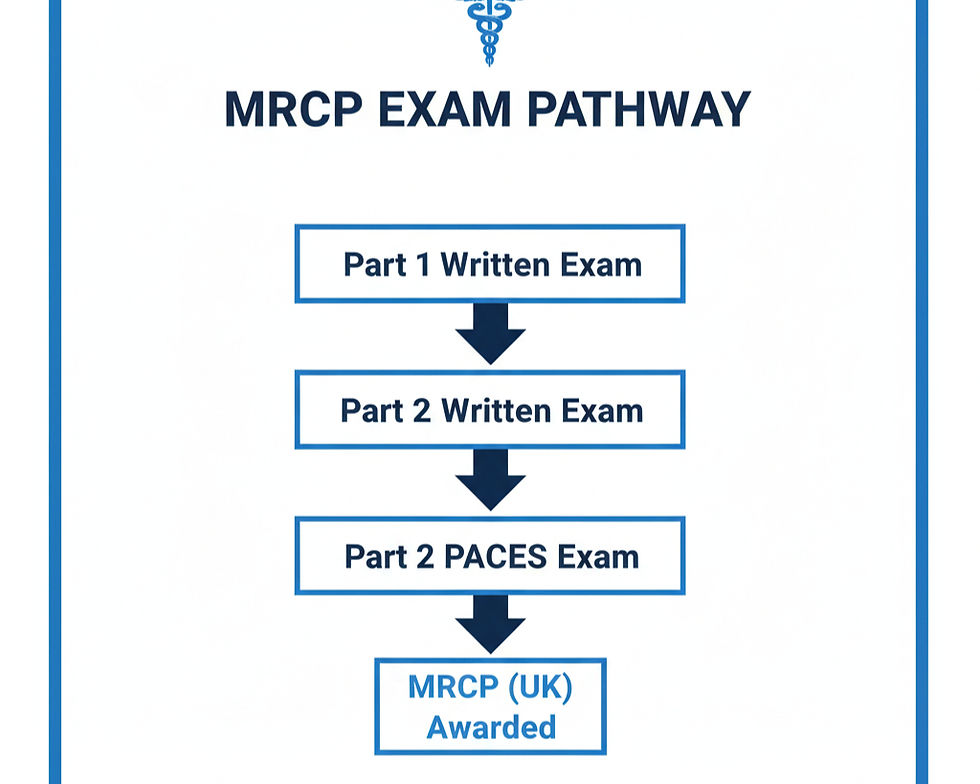What is MRCP Part 2?
- Crack Medicine

- Oct 4
- 3 min read
TL;DR: MRCP Part 2 is the second written stage of the Membership of the Royal Colleges of Physicians exam, taken after MRCP Part 1. It assesses how well you apply clinical knowledge to real-world scenarios, interpret investigations, and decide on management. This article explains the exam format, high-yield subjects, common pitfalls, and how to prepare effectively with practice questions and mock tests.
Why this matters
If you’ve passed MRCP Part 1, the next step towards full MRCP(UK) membership is Part 2. Unlike Part 1, which focuses on factual recall, MRCP Part 2 examines your ability to integrate clinical data, interpret investigations, and make immediate patient-centred decisions. Passing it moves you closer to PACES and higher specialist training.
Exam format at a glance
According to MRCP(UK), Part 2 is a written exam structured as follows:
Feature | Detail |
Number of papers | 2 |
Questions per paper | 100 (best-of-five format) |
Duration | 3 hours each |
Focus | Clinical application, investigations, and management |
Prerequisite | Must have passed MRCP Part 1 |
The questions are longer and more clinically detailed than Part 1, often with supporting data such as ECGs, imaging, or lab results.
Key subject areas
High-yield topics tested in MRCP Part 2 include:
Cardiology – acute coronary syndromes, ECG interpretation, heart failure.
Respiratory medicine – ABG analysis, tuberculosis, asthma management.
Gastroenterology – liver disease, IBD, acute GI bleeds.
Endocrinology – diabetes emergencies, thyroid and adrenal disorders.
Neurology – stroke, seizures, demyelinating diseases.
Nephrology – electrolyte imbalances, renal failure.
Haematology – anaemias, clotting disorders, transfusion medicine.
Infectious diseases – sepsis, HIV, malaria, tropical infections.
A large proportion of marks come from investigation interpretation (ECGs, chest X-rays, CT scans, ABGs).
Practical examples / mini-cases
Case vignette: A 52-year-old presents with crushing chest pain, raised troponins, and new ST-elevation on ECG.Best next step: urgent dual antiplatelet therapy and PCI referral — not “repeat ECG in 30 minutes.”
Tip: MRCP Part 2 expects guideline-based immediate management.
Data interpretation: ABG: pH 7.28, PaCO₂ 9.0, HCO₃⁻ 25.Interpretation: uncompensated respiratory acidosis.
Tip: Always start with pH → CO₂ → HCO₃.

Study strategy
A structured plan makes a huge difference:
Reinforce MRCP Part 1 knowledge – especially weak physiology and pathology.
Daily question practice – aim for 40–60 scenario questions under timed conditions.
Timed mocks – simulate both 3-hour papers back-to-back to build stamina.
Error logs – document wrong answers and revisit them weekly.
Focus on investigations – ECG, CXR, CT brain, and ABGs appear frequently.
👉 Try Crack Medicine’s free MRCP MCQs for daily practice, and progress to a mock test under exam conditions to fine-tune timing.
Common pitfalls (and fixes)
Over-focusing on rare diseases → Prioritise acute medicine and common presentations.
Poor time management → Practise finishing 100 questions in under 3 hours.
Passive reading of guidelines → Turn them into testable flashcards.
Believing in negative marking → There is none; always attempt every question.
Not linking theory to practice → Always ask, “What is the next best step for this patient?”
FAQs
Is MRCP Part 2 harder than Part 1?
Yes, it is often considered tougher because it tests application rather than recall, but Part 1 knowledge is the foundation.
How soon after MRCP Part 1 can I sit Part 2?
You can apply as soon as your Part 1 result is confirmed. Many candidates take it within 6–12 months.
How many attempts are allowed?
You may sit up to six times, with further attempts requiring special permission from MRCP(UK).
Can I take MRCP Part 2 outside the UK?
Yes. Centres exist worldwide, including India, the Middle East, and Africa.
What are the best resources for MRCP Part 2?
Use reputable QBanks, MRCP(UK) sample questions, and focused textbooks. Crack Medicine’s lectures and question banks integrate these into a structured plan.
Ready to start?
MRCP Part 2 is your chance to show real-world clinical judgement in a written exam. Build your exam readiness with free MRCP MCQs and then start a timed mock test to train under exam-day conditions. For a structured pathway, revisit our MRCP Part 1 overview and follow our study plan series on the Crack Medicine blog.
Sources
MRCP(UK): Part 2 Written Examination
Royal College of Physicians
NHS Careers: Medical training



Comments